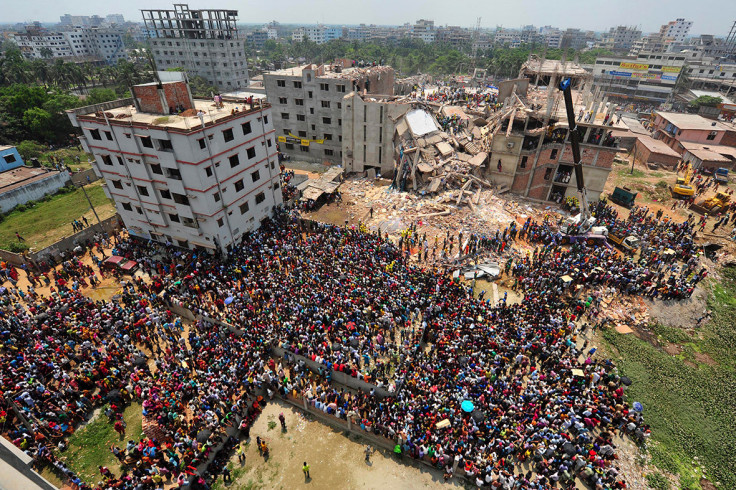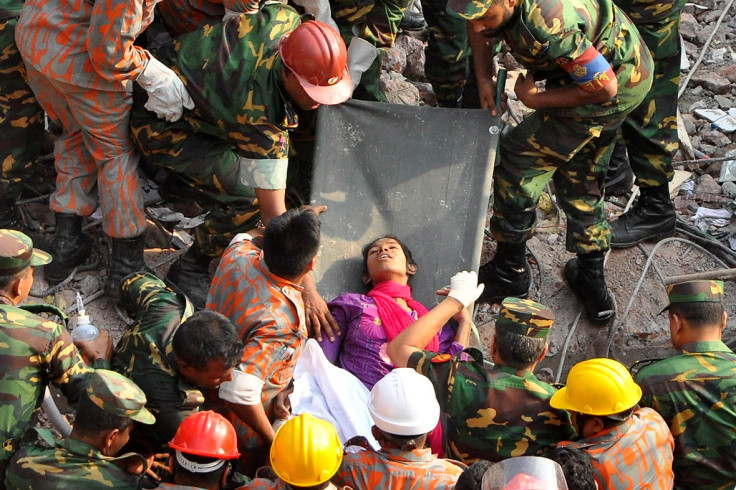Rana Plaza building collapse: Owner Sohel Rana among 41 facing death penalty for murder

The owner of the garment factory Rana Plaza in Savar, Bangladesh is at risk of being sentenced to death for his involvement in the collapse of the building that killed more than 1,000 people in 2013.
Police announced it will press murder charges against owner Sohel Rana and 40 other people including Rana's parents and government officials. If convicted, the defendants could be sentenced to death as murder is one of the crimes that carry the death penalty as indicated in the country's penal code.
"We are going to press murder charges against 41 people including the owners of the building, Sohel Rana and his parents, later today," lead investigator Bijoy Krishna Kar told AFP. "It was a mass killing. All 41 of those charged have a collective responsibility for the tragedy."
The charges initially referred to culpable homicide and shifted to homicide after investigators found that Rana, the management and some of the staff forced workers to enter the premises despite the fact they refused to work on the day of the collapse as the building had developed some cracks the day before.
The building collapsed on 24 April 2013, killing 1,137 workers in what has been deemed "one of the worst industrial accidents of the 21st century". Rana was arrested days after the incident while he was trying to flee the country.
Investigations following the incident resulted in the creation of the Bangladesh Accord on Fire and Building Safety, an agreement which binds its parties for five years to commit to creating a safe and healthy workplace environment in Bangladesh.
The disaster also prompted brands with confirmed ties to the sweatshop to pay compensations to the victims through the Rana Plaza Donors Trust Fund, backed by the International Labour Organisation (ILO).
In order to properly distribute the set target of $30m (£19m) among the victims, the scheme also developed a process, known as "the Rana Plaza Arrangement".

Benetton the last multinational company to pay compensation
Italian company Benetton was the only major multinational firm with links to Rana Plaza that did not pay compensation to the victims for nearly two years. When interviewed by IBTimes UK, the company said that by being part of the Bangladesh Accord it could contribute to "the long-term, permanent improvement of overall safety conditions for workers in the Bangladesh ready-made garment industry.
"Similarly, we partnered with Brac, a Bangladesh-based NGO, to support 280 victims and family members, from their immediate-term medical needs – including limb replacement – to ensuring that they had the means – including financial – to rebuild a sustainable future for themselves and their families."
One week before the second anniversary of the disaster, Benetton announced it will send $1.1m (£740,000) to the compensation fund, but critics said that the fund is still $8m (£5.2m) short and urged the company to pay the full amount.
Benetton claimed that its pledge doubled the amount recommended in an independent assessment by the PricewaterhouseCoopers (PwC), which is to be made public.
Marco Airoldi, CEO of Benetton Group said in a statement: "Whilst there is no real redress for the tragic loss of life we hope that this robust and clear mechanism for calculating compensation could be used more widely. For this reason, we decided to make the PwC report publicly available to all stakeholders".
"Benetton has a proud history of social commitment. We believe that by working closely with the right suppliers we can help to improve factory conditions for workers in Bangladesh and in many other parts of the world."
© Copyright IBTimes 2025. All rights reserved.





















